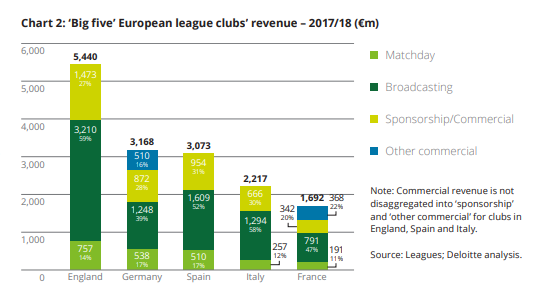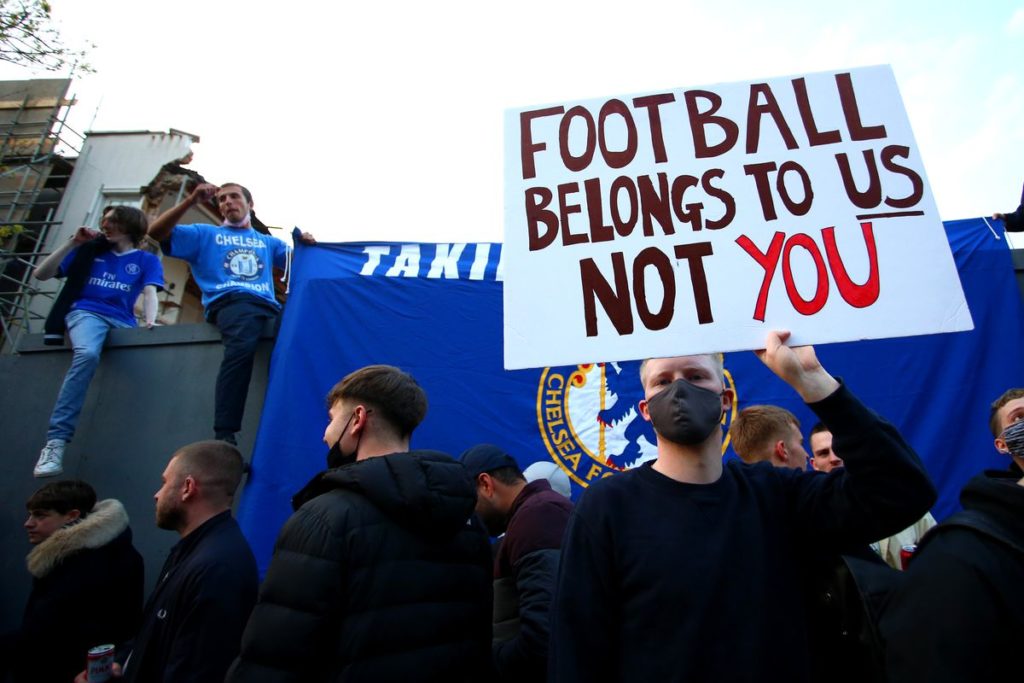Originally Published in The Next Recession
The collapse of the attempt to form a ‘super league’ of top European soccer teams by the billionaire owners of the big clubs is only an interrupted chapter in the story of the commodification of sport into profitable capitalist enterprises, owned and controlled by capital. It is no accident that JP Morgan was the fund manager for the Super League plan – as the bank epitomises the role of global capital in controlling modern sport. And it is no accident that the main driver for the new league was the president of Real Madrid, a football club dominated in the past by the corrupt Spanish monarchy and Francoism, the fascist wing of Spanish capital. Real is a membership controlled club, unlike most top clubs, but only the very rich can become president and the club lives off branding, as do most clubs. And RM has massive debts.
The Super League was going to be a cartel, designed to create a monopoly for the larger football clubs in Europe at the expense of the smaller clubs, and eventually at the expense of the ‘fans’ or followers of these clubs who would soon be paying big subscriptions to watch matches on TV or face high prices to see matches in the stadiums. But then that was already happening.
The fuss made about this cartel hides the role of capital itself. It is the same idea when economists talk about the nasty role of monopolies, as though competitive capitalism was fine and equitable and we just need to return to ‘free competition’. The reality is that football had already been capitalised: owned and controlled by billionaires, often as their playthings, but increasingly as money-making businesses. Fans have no say; players and managers follow orders. Fan organisations rail against the rule of the billionaires, but on the whole offer no solutions except to say “Now we need to do more than call their bluff and settle for the compromise of an expanded Champions League. We must rewrite the rules, remake the institutions and reassess our role as fans. “
So ending this cartel (for now) does not change the reality of the commodification of sport from its original ‘use value’ for people to play and watch into the exchange value of profit. That sport became a business began as early as the development of industrial capitalism in the mid-19th century. Take football. There are about 600 premier league professional players in England, around 4000 professional footballers in England and around 65,000 professional players in the world. Of course, from the bottom to the top, the inequalities of income or wages for footballers are huge: from one player that earns $1.5m a week to one that cannot live on football wages and needs a second job (the latter of course are the overwhelming majority). And then there are people who just play for fun, apparently about 250 million association football players in the world.

The inequalities in wages are just the same in other major sports around the world: baseball and American football, cricket and tennis. But the thing about football (soccer) and American baseball is that they are supposed to be the people’s sports. But at some important levels, they have never been ‘people’s sports’. The first is that women have been broadly excluded from playing, until fairly recently. Football was not a people’s sport’, but a men’s game, played by men and mainly watched by men. Women did not ‘do sport’ and certainly not football. Women’s football has only just got into the wider world in recent decades and remains poorly supported by capital and followers. Women were supposed to stay at home and prepare the meal when the men got back from playing or watching. In the case of cricket, women were expected to make the tea and prepare the sandwiches while their men played on the field.
Also racism was a powerful force in modernised sport. If you were black or Asian, you were excluded from professional sport. For example, it was not until 1947 that American professional baseball teams included a black player. Baseball until then was not just a man’s sport but a white man’s sport, particularly where money was involved.
Cricket originated in the medieval villages of England and France and was played by rural labourers on the whole. But it soon became a ‘toff’s sport’. At an organised level it became dominated by upper class and aristocrats (still is in England). In England, the professional game was divided between those who were ‘players’ and got paid for playing and those who were ‘gentlemen’ , who were so rich that they did not need to be paid. Indeed, at the capital of cricket, Lords in England, there were separate entrances for gentlemen and players and every year each group played the other, preserving the tradition of separation.
Of course, modern capitalism got rid of most of this when money talked. Now cricket has become a global capitalist enterprise, run by Indian billionaires employing cricket mercenaries from around the world in their lucrative competitions. Cricket has become the people’s sport in South Asia (a product of colonial rule), but it is completely commodified at the top. Indeed, the Super League football cartel already operates in cricket in India, while the old amateur leagues founder in the face of billionaire capital. Now cricket is hardly played in English state schools and professional players are almost completely drawn from private schools or from cricket ‘families’. The working class players of Yorkshire and Lancashire’s industrial areas have mostly disappeared.
Tennis was never a people’s sport. It was invented by medieval aristrocrats and played in the palaces of kings and nobles as a pastime. Tennis maintained its amateur status right into the late 20th century because it was an upper class activity. Working class English tennis hero, Fred Perry, son of a cotton spinner from Lancashire, three times Wimbledon champion and winner of eight ‘grand slams’, was never recognised by the authorities because he turned professional to make a living. Professionalism in tennis eventually triumphed when capitalism saw the profits that could be made in the sport. Now tennis is yet another globalised operation run by billionaire sponsors based on an intense global rat race for players to get their rankings and earnings.
Cycling might be considered a people’s sport as multi-millions cycle every day. But while millions cycle every weekend for pleasure, professional sport has become yet another commercial product controlled by billionaire sponsors and riddled with drug use, corruption and race fixing.
Rugby was a toffs sport, on the whole, although in the mining valleys of Wales it gained adherence from local communities as a people’s sport (men only). Otherwise it was the main sport of farmers in the richer areas of England, France and the colonial countries of Australia, New Zealand and South Africa – and in the private schools of the upper classes. Rugby League was a development in the working class areas in the north of England and was formed professionally so that working-class players could be paid – something frowned upon by the Rugby Union authorities.. The irony is that capital eventually made rugby union go professional and that is where the money is now, and rugby league is the poor relative.
The people’s game of baseball in America was brought to the new continent by immigrants playing older bat and ball games in England. But it too has been totally commercialised in ‘super league franchises’. American football was never really a working class sport, but came from the Ivy league colleges of the rich, like rugby in the UK. Now working class kids with sporting talent desperately try to get scholarships in football, tennis and basketball as a stepping stone to riches of the professional leagues – and of course, only a tiny minority ever make it, despite huge sacrifices.
Football was a truly working class sport in Europe. It was first played by rural labourers in villages and then workers in industrial cities. And it was mostly played for little or no money. And it was followed by working class men (and some women). For many working class people with talent it was a way out of poverty, just as boxing had been also. But capital took it over in the last 150 years or so. Now football is a business run by billionaires for their enjoyment and funded increasingly by global capital. Football clubs have shareholders and are quoted on the stock exchanges. The Super League saga is only the latest chapter in the commodification by capitalism of sport.
Sport is now operated at the top by capital for capital, and the top players are like gladiators in ancient Rome, paid much (at the top) and adored by millions, but are soon dropped for the next bunch, while sport for profit rolls on. Hundreds of millions watch these gladiators for entertainment; but less actually do the sport itself.
What the story of football and other sports tells us is that football cannot become a people’s sport again under capitalism. To achieve that requires that stadiums and clubs should be in public ownership and that clubs should have members on the basis of one person one vote to decide their activities of clubs. Sport should be state-funded only, not by capital. Players should be employed on reasonable wages like any other job. Private capital and sport for profit must be replaced by a real people’s sport, run by the people for the people. The implementation of such an approach would not be possible on its own but only as part of a wider programme of public ownership and democratic control in society in general.










